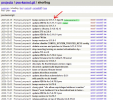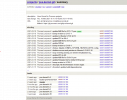Ubuntu has no newer tagged release, so there's nothing to update too. What do you expect from working/changing with the slightly newer stable version? I suggest reading a git submodule tutorial, or the documentation:
https://git-scm.com/book/en/v2/Git-Tools-Submodules if you actually want to work with the kernel repo. Basically you just need to cd into the respective submodule directory, add a kernel git remote (Ubuntus, or stable Linux tree) and rebase/cherry-pick whatever commits you like.
As soon as there's an actual release tagged we will update, sooner or later. Now, that this is only as opt-in and not default we do not invest to much time in it, as minor releases often have a "bad ROI", i.e., lots of work to package and test but not much fixed/improved (its always different, but often there are just patches for other architectures like POWER, SPARC or arm or the like)). We try to distribute our work time such that all features and subprojects get the attention needed, build just every minor kernel release (there are weeks with four in them) is just to much overhead.
You probably can just disable the fwcheck for self-builds, it is for our buildsystem to keep pve-firmware upto date if there's new firmware a module can use.
I'd not disable the ABI check, though, that is good for everybody to ensure modules have a useable ABI. If that fails you can normally just bump the kernel local release version for your build (or see what changed why).




